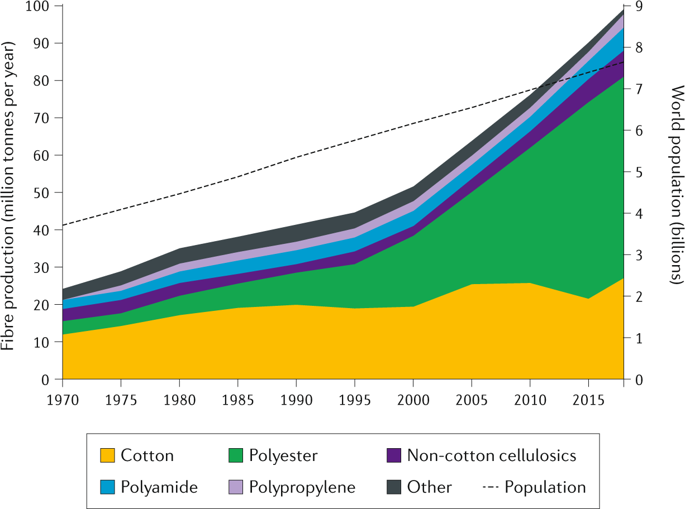Nature Reviews Earth & Environment ( IF 49.7 ) Pub Date : 2020-04-07 , DOI: 10.1038/s43017-020-0039-9 Kirsi Niinimäki , Greg Peters , Helena Dahlbo , Patsy Perry , Timo Rissanen , Alison Gwilt

|
The fashion industry is facing increasing global scrutiny of its environmentally polluting supply chain operations. Despite the widely publicized environmental impacts, however, the industry continues to grow, in part due to the rise of fast fashion, which relies on cheap manufacturing, frequent consumption and short-lived garment use. In this Review, we identify the environmental impacts at critical points in the textile and fashion value chain, from production to consumption, focusing on water use, chemical pollution, CO2 emissions and textile waste. Impacts from the fashion industry include over 92 million tonnes of waste produced per year and 79 trillion litres of water consumed. On the basis of these environmental impacts, we outline the need for fundamental changes in the fashion business model, including a deceleration of manufacturing and the introduction of sustainable practices throughout the supply chain, as well a shift in consumer behaviour — namely, decreasing clothing purchases and increasing garment lifetimes. These changes stress the need for an urgent transition back to ‘slow’ fashion, minimizing and mitigating the detrimental environmental impacts, so as to improve the long-term sustainability of the fashion supply chain.
中文翻译:

快速时尚的环保价格
时装行业正面临全球对其环境污染供应链运营的审查。尽管受到了广泛的环境影响,但该行业仍在继续增长,部分原因是快速时尚的兴起,快速时尚依赖廉价的制造,频繁的消费和短寿命的服装使用。在这篇评论中,我们确定了纺织品和时装价值链中从生产到消费的关键时刻对环境的影响,重点是用水,化学污染,CO 2排放和纺织废料。时装业的影响包括每年产生超过9200万吨的废物和79万亿升水的消耗。在这些环境影响的基础上,我们概述了时尚商业模式的根本变化的必要性,包括制造业的减速和整个供应链中的可持续实践的引入,以及消费者行为的转变,即减少服装购买并延长了服装的使用寿命。这些变化强调了迫切需要紧急过渡到“慢速”时尚,最大程度地减少和减轻不利的环境影响,以改善时尚供应链的长期可持续性。











































 京公网安备 11010802027423号
京公网安备 11010802027423号